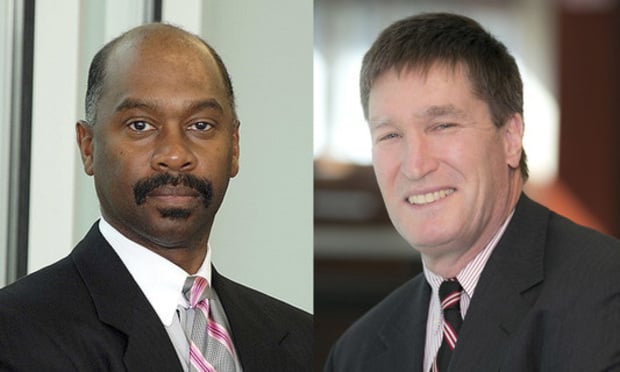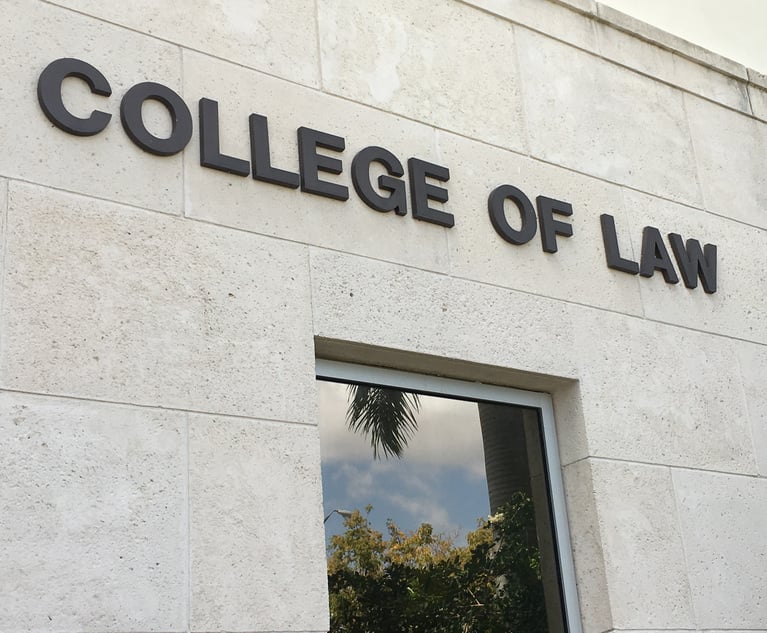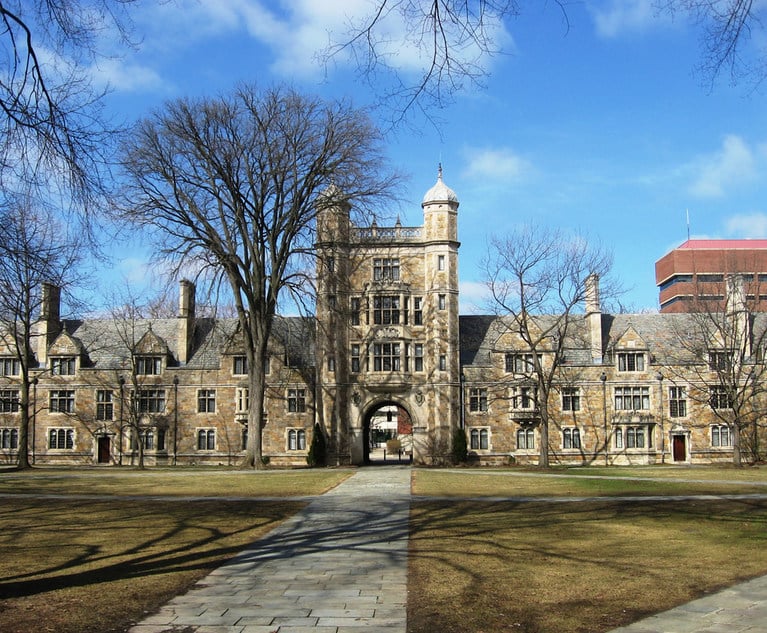Confidential Report Sets Stage for Emory Law Prof's Hearing Over N-Word
Suspended law professor Paul Zwier is fighting for reinstatement at a hearing Friday. A 75-page report by Emory's Office of Equity is recommending his continued suspension without pay.
October 03, 2019 at 11:48 AM
12 minute read
 James Hughes Jr. (left) and Paul Zwier. (Courtesy photos)
James Hughes Jr. (left) and Paul Zwier. (Courtesy photos)
A confidential report by Emory University administrators recommending that a law professor's suspension be continued without pay for as long as two years for using a racial epithet will play a key role in a hearing to determine his academic fate.
The university faculty hearing committee convenes Friday to decide whether to accept the conclusion of a report by Emory's Office of Equity and Inclusion (OEI) that professor Paul Zwier violated the university's discrimination and harassment policy last year or to reinstate him.
The five-member committee is chaired by Aryeh Stein, an epidemiology professor at Emory's Rollins School of Public Health.
Zwier's counsel, attorneys Lee Parks and Travis Foust of Atlanta's Parks Chesin & Walbert, have said they plan to mount a vigorous defense of Zwier at the hearing and seek his reinstatement.
The unsigned report concluded that Zwier's use of the n-word in a first-year torts class and his subsequent use of a variant of the epithet in a private conversation constituted "a pattern of discriminatory harassment" that was "so severe" it created "an intimidating, hostile, or offensive educational environment" that was "disruptive" and interfered with students' academic performance.
The 75-page report, a copy of which was obtained by Law.com affiliate The Daily Report, also determined that Zwier's use of the epithet in class and during a meeting two months later with Justin Tolston—a 27-year-old black master of laws candidate with a law degree from Texas Southern University—served no scholarly purpose and wasn't protected by principles of academic freedom or free expression.
The report, which uses the racial epithet in full multiple times, also recommends a continuation of Zwier's current banishment from the law school campus and all of its events for a period to be determined by the dean. The report noted that first-year law students exposed to Zwier's use of the epithet last year will graduate in 2021.
Law school administrators instructed Zwier to apologize for using the epithet when he called on a black student while referencing a 1967 civil assault case in a first-year torts class last year. Zwier said later that in using the n-word, he intended to suggest that the court record was sanitized and that the plaintiff had actually been called the inflammatory epithet.
At the time, the law school also barred Zwier from teaching other first-year law classes.
Two months later, Tolston told law school faculty and other students that Zwier used the epithet a second time during a meeting in the professor's office, according to the OEI report.
Zwier told the OEI that Tolston came to his office to ask why the professor used the epithet in class. But Zwier said Tolston quickly accused him of growing up in a household where the racial epithet was frequently used, according to the report.
Zwier—who has trained attorneys and judges in litigation and dispute resolution in Kenya, Liberia, Tanzania and other countries in concert with the Carter Center—told OEI investigators that he explained to Tolston his father had marched for civil rights, and that he had been called a "n-r lover" as a teenager because of his friendship with other black students.
Zwier said as soon as he used the variant of the epithet, Tolston responded, "There you go again."
Tolston quickly informed other students, faculty, the university president and Emory's board of trustees that Zwier used the n-word a second time. Students and faculty that Tolston spoke to told the OEI that he seemed visibly shaken following the meeting with Zwier, and became inattentive and unusually quiet in class.
When students who heard about the conversation complained to the law school's then-interim dean, James Hughes Jr., that Zwier had used the epithet again, Hughes, the first African American dean of the law school, suspended Zwier indefinitely, barred him from campus and all law school events and asked the OEI and Inclusion to investigate.
Last spring, when Zwier asked the Faculty Hearing Committee to reinstate him, Hughes privately called on the committee to terminate Zwier, according to letters supporting Zwier by the American Association of University Professors.
The AAUP became involved after retired Emory law professor William Carney asked the organization in April to censure the university and place it on academic probation over its treatment of Zwier. The AAUP and the Foundation for Individual Rights in Education have asked Emory to reinstate Zwier.
Tolston refused to cooperate with OEI investigators and warned them not to contact him again, according to the report. The office also elected not to pursue two other complaints Tolston made: one against Hughes, whom Tolston claimed had threatened him, and one against university trustees whom Tolston accused of promoting a campus culture that "allows for the feeling of intolerance," the report said.
"Absent the opportunity to meet with Mr. Tolston to gather additional information and define the scope of his concerns, OEI could not proceed with an investigation," it said.
Tolston on Thursday called OEI's assertion "patently untrue."
Tolston said the office contacted him after he met with Emory president Claire Klerk's chief of staff to complain that Zwier used the racial epithet a second time. Notes of that meeting were forwarded to OEI, he said. Tolston also said he sent a 12-page letter to the trustees.
Tolston initially said he declined to meet with OEI staff because he needed to focus on his classes. On Thursday, Tolston added that he also wouldn't meet with investigators because they declined his request to have counsel present.
He said he contacted OEI's vice president some time later about speaking to investigators without counsel, and was told they had concluded the investigation.
The university administration, he added, "persistently tried to minimize, disregard, and otherwise play down the harm done" by Zwier "to save face rather than reckon with the deep vein of intolerance that is pervasive at Emory."
In investigating whether Zwier violated school policies, the OEI relied on accounts by faculty and students who either talked to Tolston or talked to people who had talked to him about his conversation with Zwier.
Among those interviewed was a white law student who recorded her own conversation with Zwier during which she tried to have the law professor reconstruct his conversation with Tolston, according to the report and a transcript of the conversation obtained by The Daily Report.
Law student Ariana Peden later circulated what she said was a selectively edited version of the recording intended to highlight Zwier's use of the n-word, according to OEI interviews. That recording also played a role in Zwier's suspension.
Peden told OEI that Zwier "wanted me to understand that in his perception, just saying that 'Professor Zwier said the n' word again to a black student' was taking it out of context."
"That shows he did not learn his lesson," she said, adding that she attempted to show Zwier "why his apologies were not apologies and why people still don't trust him."
What Zwier told her during that conversation did not conflict with Tolston's recollection, she said.
During that conversation with Peden, Zwier also told her, "My whole life has been devoted to race relations where people are working together and trying to get along and trying to fight racism … whether it's international or national. It's who I am as a lawyer. It's who I am in my daily living," according to a copy of the recording. "I'm the wrong guy to be subject to this kind of attack as if I'm cavalier or insensitive or … misunderstanding how it can cause harm."
Peden told OEI that she and other student leaders want Zwier "gone" from campus. "I'm paying a lot of money to go here," she said. "One of my best friends said if you want inclusion, you have to make it safe for marginalized communities. I think removing Zwier would help."
Hughes, the interim dean, told OEI investigators that he never talked to Tolston about the conversation with Zwier. Tolston, he said, "has a little bit of a credibility problem with me."
Hughes said he suspended Zwier after two other students heard about Tolston's conversation with Zwier and complained. Hughes said he asked Zwier if he had used the epithet and Zwier replied, "I was describing something I had been called."
Hughes said that, based on what Zwier told him, and other students' accounts, "It was clear to me that he had, in fact, used the [n-] word."
Hughes also said he didn't threaten Tolston. He said that, after Tolston accused him of telling students they would "just have to get used to hearing the n-word," he simply warned him, "You need to be careful what you say."
"I was saying, 'You need to be careful that you don't slander or libel people,'" Hughes said in the report. Tolston then "said something about free speech," Hughes recalled. "He said, 'The truth is a defense.' I said, 'You're right about that, and I walked off. … I didn't have time to deal with him."
Tolston said he told Hughes he intended to write an op-ed piece about Zwier and Emory. Hughes then warned him the matter was under investigation and to "be careful what you write."
"I responded: 'The truth is a[n] absolute bar to recover for libel,'" Tolston recalled. He said he then reported what he called Hughes' 'threat' to Assistant Dean Jessica Dworkin, who "assured me it would be escalated."
Students and faculty, including the president of the Black Law Student Law Association, also raised concerns about what one professor described as Tolston's occasionally "erratic" behavior even as they began demanding Zwier's removal.
The OEI report includes accounts from law school administrators that student leaders complained Tolston was spreading falsehoods about them and misrepresenting conversations he allegedly had with law school faculty and administrators. Tolston also allegedly verbally berated some students, including the BLSA's female president, whom he also threatened to sue, according to the report.
Tolston also told some students that the law school "accused him of fraud" and was attempting to discredit him after he maxed out his financial aid and the law school stopped covering his out-of-pocket expenses, associate law school dean Ethan Rosenzweig said in an interview with the OEI.
"He started sending very aggressive emails to central financial aid to the point where I brought him in my office to talk about professionalism," Rosenzweig said. Rosenzweig said he soon began receiving reports from students that Tolston "said the school is trying to say that he's crazy and minimizing his credibility."
Tolston said he never threatened to sue the BLSA or its president. He said the issue arose after he was asked by the president not to bring a sign to a campus rally intended to promote unity that said "Fire Zwier" and "I am not a N-r," printed in full.
Tolston said he took the sign to the rally over BLSA objections because it was "well within my First Amendment right."
Zwier, too, raised questions about Tolston's credibility, claiming Tolston mischaracterized their conversation, which Zwier called "a setup." Zwier told investigators that Tolston was an activist with an agenda who had been embroiled in previous public confrontations over racial issues—an assertion backed up by published accounts of Tolston's activities.
"I was trying as much as I could [to explain] what my family background was. It was not meant disparagingly to any group," Zwier said in explaining why he told Tolston he had been called a "n-r lover."
But Zwier also contended that his suspension was driven by "political correctness and bullying" by a law school "so worried about the charge of racism that it is able to walk away from good people because it's afraid the news is going to pick it up."
"That's wrong," he said. "It's a violation of my academic freedom. It's defamation. … It injures me all across the board."
Tolston's behavior and credibility issues didn't alter the opinion of faculty members interviewed by the Office of Equity and Inclusion that Zwier should be fired.
Faculty and administrators interviewed by the OEI said they wanted Zwier barred from law school events so they wouldn't be forced to sit near or converse with him for fear students or other faculty may think they're racists.
Others questioned the sincerity of Zwier's initial public apology and took issue with what some perceived as Zwier's stance that he was a victim.
Some faculty interviewed by OEI said the decision to bar Zwier from teaching first-year law classes for two years, and then to suspend him, unfairly increased their own course loads, even though they earned less than the suspended professor. Others fretted that the publicity would make the law school less competitive for minority students or play to stereotypes associated with the segregated South.
In his interview with OEI, Hughes branded Zwier's initial apology as "half-hearted" and took issue with Zwier's posture as "the victim."
"He thinks he was set up by Justin," Hughes said. "He might well have been. That's irrelevant. There's no such thing as private entrapment. … Even if he was, he's the adult in the room."
Hughes acknowledged some faculty "are incredibly upset with Paul for having used that kind of language" while other faculty "feel that Paul is being put upon, that he's the victim in all of this. It's tearing at the community."
"Some of the African American students really don't feel protected," Hughes continued. "I think in some ways they think I'm not protecting them because I should have fired this guy."
This content has been archived. It is available through our partners, LexisNexis® and Bloomberg Law.
To view this content, please continue to their sites.
Not a Lexis Subscriber?
Subscribe Now
Not a Bloomberg Law Subscriber?
Subscribe Now
NOT FOR REPRINT
© 2025 ALM Global, LLC, All Rights Reserved. Request academic re-use from www.copyright.com. All other uses, submit a request to [email protected]. For more information visit Asset & Logo Licensing.
You Might Like
View All
Florida Law Schools Are Seeing a Bump in Applications for 2025, After Recent Declines at Flagship Schools
3 minute read

Law School Applications are Up Across the Country. Law Deans Aren't Sure Why
6 minute read
Librarian's Termination Violated First Amendment Protections, Lawsuit Claims
3 minute readTrending Stories
- 1Judge Grills DOJ on Trump’s Birthright Citizenship Executive Order
- 2Exceptional Growth Becoming the Rule? Demand and Rate Hikes Drove Strong Year for Big Law
- 3Dentons Taps D.C. Capital Markets Attorney for New US Managing Partner
- 4Auto Dealers Ask Court to Pump the Brakes on Scout Motors’ Florida Sales
- 5German Court Orders X to Release Data Amid Election Interference Concerns
Who Got The Work
J. Brugh Lower of Gibbons has entered an appearance for industrial equipment supplier Devco Corporation in a pending trademark infringement lawsuit. The suit, accusing the defendant of selling knock-off Graco products, was filed Dec. 18 in New Jersey District Court by Rivkin Radler on behalf of Graco Inc. and Graco Minnesota. The case, assigned to U.S. District Judge Zahid N. Quraishi, is 3:24-cv-11294, Graco Inc. et al v. Devco Corporation.
Who Got The Work
Rebecca Maller-Stein and Kent A. Yalowitz of Arnold & Porter Kaye Scholer have entered their appearances for Hanaco Venture Capital and its executives, Lior Prosor and David Frankel, in a pending securities lawsuit. The action, filed on Dec. 24 in New York Southern District Court by Zell, Aron & Co. on behalf of Goldeneye Advisors, accuses the defendants of negligently and fraudulently managing the plaintiff's $1 million investment. The case, assigned to U.S. District Judge Vernon S. Broderick, is 1:24-cv-09918, Goldeneye Advisors, LLC v. Hanaco Venture Capital, Ltd. et al.
Who Got The Work
Attorneys from A&O Shearman has stepped in as defense counsel for Toronto-Dominion Bank and other defendants in a pending securities class action. The suit, filed Dec. 11 in New York Southern District Court by Bleichmar Fonti & Auld, accuses the defendants of concealing the bank's 'pervasive' deficiencies in regards to its compliance with the Bank Secrecy Act and the quality of its anti-money laundering controls. The case, assigned to U.S. District Judge Arun Subramanian, is 1:24-cv-09445, Gonzalez v. The Toronto-Dominion Bank et al.
Who Got The Work
Crown Castle International, a Pennsylvania company providing shared communications infrastructure, has turned to Luke D. Wolf of Gordon Rees Scully Mansukhani to fend off a pending breach-of-contract lawsuit. The court action, filed Nov. 25 in Michigan Eastern District Court by Hooper Hathaway PC on behalf of The Town Residences LLC, accuses Crown Castle of failing to transfer approximately $30,000 in utility payments from T-Mobile in breach of a roof-top lease and assignment agreement. The case, assigned to U.S. District Judge Susan K. Declercq, is 2:24-cv-13131, The Town Residences LLC v. T-Mobile US, Inc. et al.
Who Got The Work
Wilfred P. Coronato and Daniel M. Schwartz of McCarter & English have stepped in as defense counsel to Electrolux Home Products Inc. in a pending product liability lawsuit. The court action, filed Nov. 26 in New York Eastern District Court by Poulos Lopiccolo PC and Nagel Rice LLP on behalf of David Stern, alleges that the defendant's refrigerators’ drawers and shelving repeatedly break and fall apart within months after purchase. The case, assigned to U.S. District Judge Joan M. Azrack, is 2:24-cv-08204, Stern v. Electrolux Home Products, Inc.
Featured Firms
Law Offices of Gary Martin Hays & Associates, P.C.
(470) 294-1674
Law Offices of Mark E. Salomone
(857) 444-6468
Smith & Hassler
(713) 739-1250








